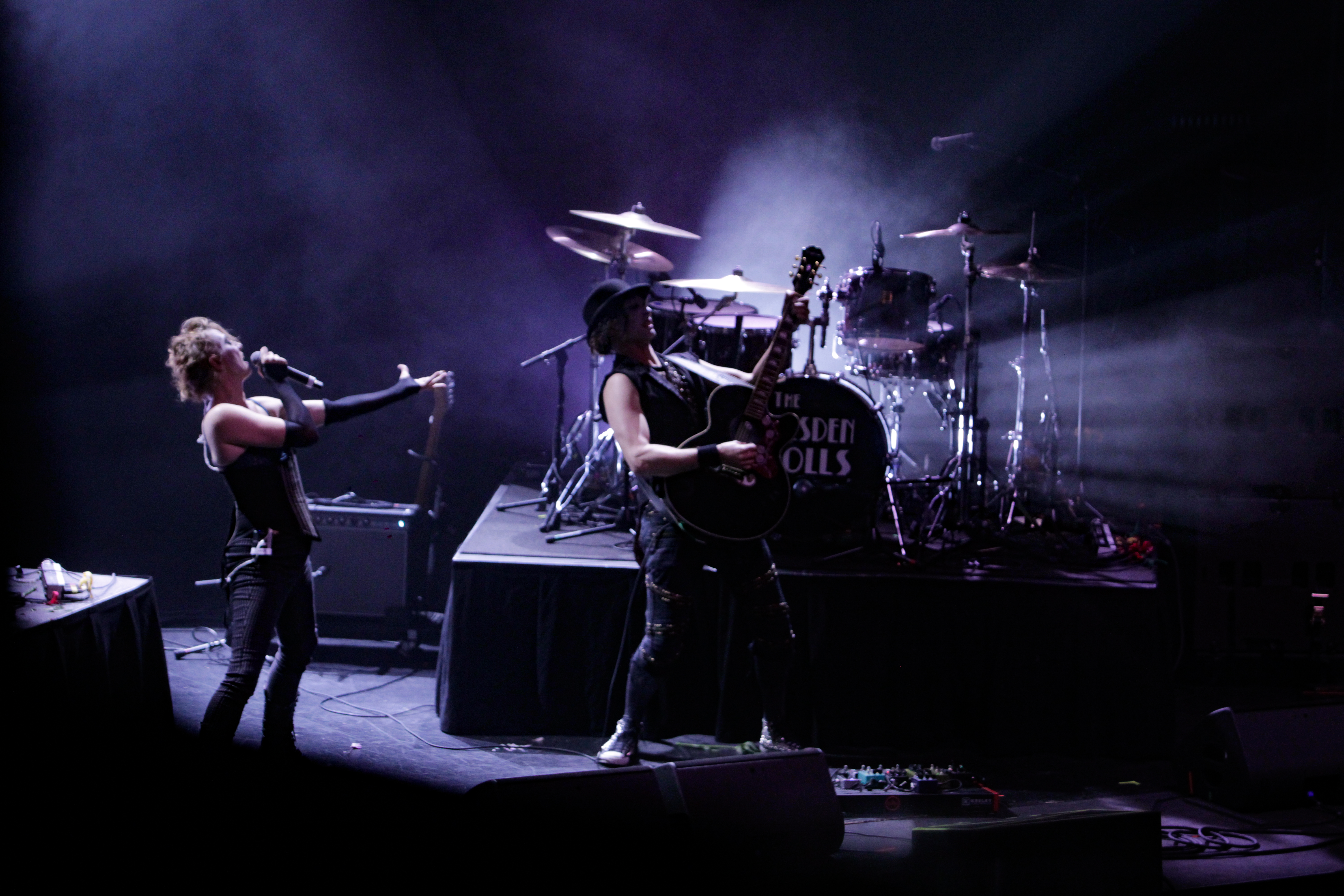DRESDEN DOLLS @ ROADRUNNER 11/1
Photography by Andy Alembik
Review by Robin Sheng
The Dresden Dolls performed in their hometown, Boston, at Roadrunner on November 1, the 24th anniversary day of the band’s formation. Known primarily for their punk-influenced Dark Cabaret music during the early to mid-2000s, the band attracted a crowd that was visibly older on average.

As two lone rays of light shined onto vocalist-keyboardist Amanda Palmer and Drummer Brian Viglione, The Dresden Dolls began their performance. The opening song, “Good Day,” perfectly captured every element that made the band special: passionate keyboards, energetic drums, and above all, Palmer’s distinctly bitter voice. The peculiar qualities of Palmer’s voice in the live setting were especially constructive to delivering the song’s unforgiving sarcasm, evoking an intense atmosphere alongside Viglione’s passionate drumming.

Palmer’s vocal capabilities were further shown in other songs, such as “Mandy Goes to Med School,” a song about her experience undergoing abortion that is especially relevant for the current age. Substantial power and strength can be felt from Palmer’s voice, especially during the song’s emotional climax at its final segment, which included an ingenious interpolation of the classic George Michael song “Careless Whisper” that was not present in the regular studio version of the song. In the band’s performance of “Coin-Operated Boy,” which is arguably their most well-known song, Palmer’s vocal dynamics and stylistic diversity were further shown. The playful flair in her voice during the verses was seamlessly juxtaposed with the more mellow and emotional performance during the bridge.

Almost as impressive as Palmer’s vocals were her keyboard performances. During the song “Gravity,” Palmer incorporated several extravagant displays of her keyboard skills that nevertheless felt entirely suitable for the performance. “Missed Me” is another song where her keyboard playing is particularly notable, as the crisp and forceful riff that repeats throughout the song is essential in driving the ominous atmosphere of the song forward. Palmer’s keyboards were also notably dynamic in volume and expression, as shown in songs such as “Half Jack,” where particular notes were played with a level of strength and suddenness that made me shiver through every part of my body.

Equally significant to the band’s energy and passion, of course, is Viglione’s drumming. In the beginning sections of “Coin-Operated Boy,” Viglione’s drumming was essential to establishing a suitably energetic yet lighthearted atmosphere. Together, the two members of the band presented a sound that was distinctly evocative and emotionally sincere, maintaining an energy that captivated the audience throughout the entire performance.

One further highlight that made this concert particularly special was the significance of the concert for the band’s relationship to their hometown. Not only is the concert on the 24th anniversary day of their formation, but it is also their first concert in Boston in many years. Palmer, who left the city a long time ago and got stuck in New Zealand for several years due to COVID-19 travel restrictions, only moved back to Boston recently for a few months. As such, the concert had a distinct “homecoming” atmosphere that is especially apparent in Palmer’s narration of the stories of the band and the inspirations for their various songs during intermissions. The band performed three songs that they considered particularly relevant to their relationship with their hometown, “The Jeep Song,” “Massachusetts Avenue,” and “Boston.” With the aid of supporting acts Johnny Manchild and Veronica Swift, the first two songs were performed with a full band that made them sound much more layered and energetic.

The Dresden Dolls also played two new songs, “Whakanewha” and “Another Christmas,” both of which pertain to their recent living experiences. Unfortunately, I found the band’s new songs to be rather lacking in the histrionic flair and attitude that made their work distinct from their contemporaries.

The concert ended with two encore performances consisting of the respective closing tracks for the band’s debut and sophomore albums. Palmer introduced “Truce” as a deeply emotional breakup song, stating that “This song hurts more than it ever could, which is, of course, we are going to f**king play it.” The song consisted of quiet and depressive verses that developed into an explosive outro that felt precisely like a cathartic release of every previous emotion delivered throughout the show. The concert ended with the anthemic “Sing,” in which guest performers Johnny Manchild and Veronica Swift were welcomed back on stage. Once again amplified in resonance by the help of a full band, the song served as the perfect closer for the show. As Palmer sang the words “Life is no cabaret,” it became obvious to me that for all of the dramatic flair and extravagant energy that the Dresden Dolls are known and loved for, the themes and sincere emotions expressed in their music are, in fact, more relevant than ever.

